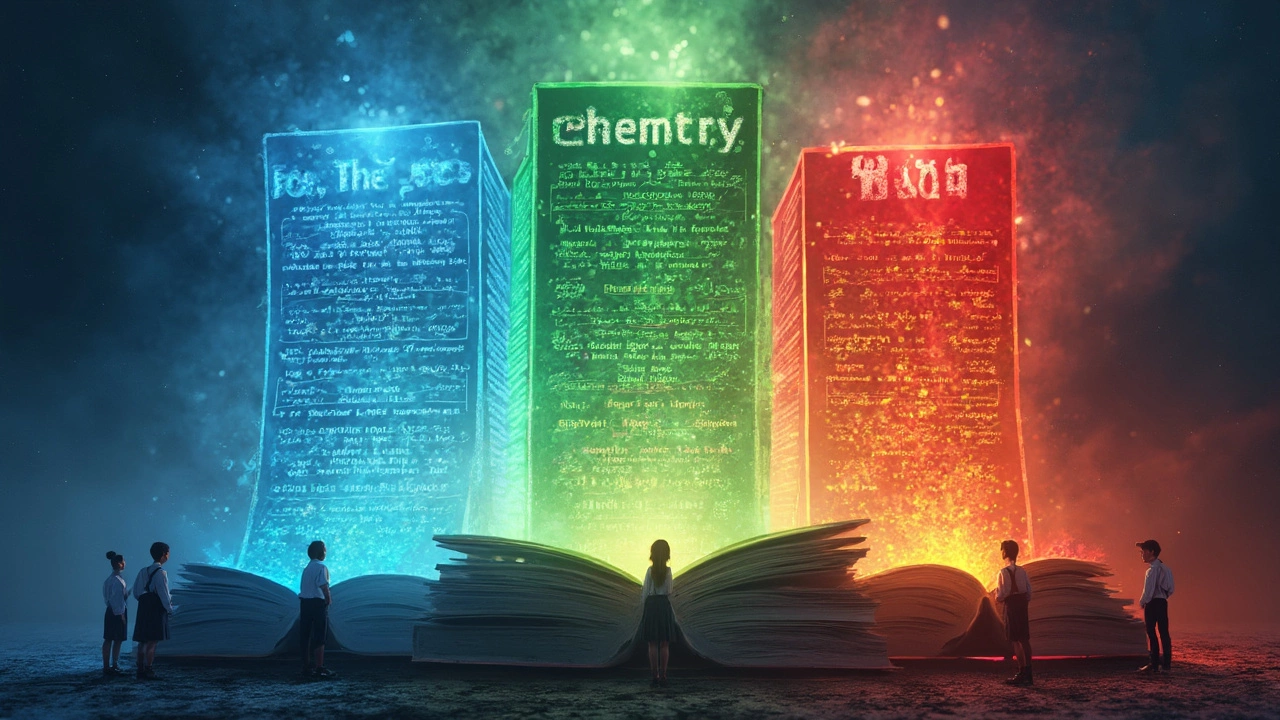Most Scoring Subject in JEE: What Really Works for High Marks

If you’re grinding for the JEE, you’ve probably wondered, 'Which subject will actually help me score the most?' It’s not just about loving Physics or dreading Math—let’s face it, marks matter when every point could mean the difference between your dream IIT or a backup plan.
Ask around, and almost every serious JEE aspirant or coaching expert will tell you: Chemistry is the easiest subject to score marks in. Year after year, stats show students getting their highest subject marks here. But it’s not just because the questions are basic—it’s about how predictable and straightforward the syllabus is compared to the wild cards in Physics or the trap-laden calculations in Math.
To put it simply, if you want to boost your total rank with the least stress, Chemistry is your best bet. But there’s a catch—just knowing this isn’t enough. You need to know what topics to focus on and what sort of questions JEE loves to ask. That’s how you turn 'most scoring' into your own advantage, not just a coaching-center catchphrase.
- Why Scoring Matters: The JEE Competition
- Breaking Down the Numbers: Which Subject Delivers
- Chemistry's Advantage: Why It Tops the List
- Real-World Tips: How to Max Out Your Score
Why Scoring Matters: The JEE Competition
The most scoring subject JEE debate isn’t just for show — your subject scores decide everything about your IIT journey. In JEE Main alone, over a million students fill out the forms each year, but less than 2% get into the top IITs. Every single mark can move your rank by hundreds or even thousands of spots. Think about it: a difference of just 10 marks has made the gap between a Computer Science seat at IIT Bombay or scrambling for a newer college.
Let’s talk numbers for a second. Here’s what the 2024 JEE Advanced cutoffs looked like for popular branches at the *best* IITs:
| Course | IIT Bombay | IIT Delhi |
|---|---|---|
| Computer Science | 68 | 102 |
| Electrical Engineering | 495 | 609 |
Your high score JEE game isn’t just about the prestige or showing off. It’s about giving yourself genuine options — better branches, better campuses, access to better internships, and even more confident back-up plans if something doesn’t go your way.
And get this: since the paper gives equal weight to Physics, Chemistry, and Math, nailing the most scoring subject gives you a real edge. Instead of wasting energy everywhere, you can aim to hit almost full marks in that one zone. That's what gives toppers an extreme advantage.
At the end of the day, smart scoring is about doing less but better. That’s what’ll set your JEE prep apart from just grinding blindly like the crowd.
Breaking Down the Numbers: Which Subject Delivers
When you look at recent JEE Main and Advanced results, a clear trend jumps out. More toppers lock down their highest marks in most scoring subject JEE — you guessed it, Chemistry. Let’s get specific. In JEE Main 2024, the average score in the Chemistry section was about 74 out of 100, while Physics hovered near 62, and Math sat at around 59. It’s not just a coincidence. Chemistry’s theory-based questions, repeated topics, and less calculation-heavy problems make it much easier to master and attempt quickly in the actual paper.
| Subject | Average Topper Score (JEE Main 2024) |
|---|---|
| Chemistry | 74 |
| Physics | 62 |
| Math | 59 |
Chemistry’s predictability gives it a big edge if you’re aiming for the best JEE subject to boost your rank. Chapters like 'Organic Chemistry – Basic Principles' and ‘Coordination Compounds’ are favorites in almost every paper. They carry a lot of weight, and you’ll find them repeated year after year, which is great for focused revision.
On the other side, Physics hits you with concepts all across the board. It’s more trap-laden—one misstep in calculation or logic and there goes accuracy. Math? It’s tough because not only are the questions tricky, but speed is a huge factor. You could easily lose time on lengthy problems and miss easier ones.
If you’re not scoring high yet, remember this: flipping through past toppers’ answer sheets, you’ll see many of them skip Physics and Math problems, saving time for Chemistry. Most say they “secure” their marks with Chemistry, then gamble with the harder parts. If you want a strategy that works for high score JEE, this is it. Target Chemistry to lock in marks, then use the extra time for the tougher subjects.

Chemistry's Advantage: Why It Tops the List
It's almost a running joke among JEE veterans: if you want easy marks, head for Chemistry. But this isn't some wild myth—Chemistry consistently ranks as the most scoring subject in JEE. More students max out in Chemistry compared to Physics or Math. There's a reason almost every JEE topper has Chemistry as their highest subject score.
So, what makes Chemistry the best bet for a high score? Part of it comes down to predictability. Out of the three subjects, Chemistry follows the syllabus almost to the letter. Rarely will you see any question that feels way out of the NCERT textbook range. Even the types of questions—factual, direct, and based on well-defined theory—make it possible to master the paper with smart revision.
If you glance through last year's cutoff stats, you’ll notice that Chemical scores tend to be the highest, both in the median range and the top percentiles. That's because the time-to-marks ratio is the best: most questions are direct, and factual recall is rewarded. You don't have to get stuck in endless calculations or long proofs like you do with Math or Physics.
| Subject | Average Top 100 Score (2024 JEE Main) |
|---|---|
| Chemistry | 91/100 |
| Physics | 84/100 |
| Math | 80/100 |
Breaking it down, Chemistry has three parts: Physical, Organic, and Inorganic. Physical Chemistry may require calculations, but the formulas are rarely tricky. Organic Chemistry is all about practicing reaction mechanisms and remembering basic named reactions—once you get it, everything starts to repeat. Inorganic is straight from the NCERT. If you can remember key facts—like color, valency, and trends in the periodic table—you can pick up marks fast.
- Memorizing from NCERT almost guarantees you 70%+ of the marks in this section.
- Lots of previous year questions get repeated, especially for Inorganic and Organic.
- Time pressure is the lowest: Chemistry can be finished quickly, leaving you stress-free for tougher sections.
If you want to up your total score without extra stress, make Chemistry your first priority. A solid routine can take you a very long way here—regular NCERT revision, daily fact recall, and solving as many JEE pattern questions as you can get your hands on.
Real-World Tips: How to Max Out Your Score
So you’ve figured out that Chemistry is usually the most scoring subject in JEE. But here’s the deal: not every student manages to crush it. Cracking the code takes more than reading NCERT books twice. The real game-changer is how you work smart, not just hard.
First tip—prioritize the sections that JEE repeats year after year. According to recent JEE Main analysis, more than 60% of the Chemistry paper comes from basic topics like Physical Chemistry calculations, Organic reaction mechanisms, and direct theory questions from Inorganic. You can’t afford to skip memorizing the NCERT Inorganic tables—seriously, some questions lift lines word-for-word.
- NCERT is king: Don’t treat NCERT books like side material. Most best JEE subject toppers underline every line and even revise tough concepts regularly.
- Master Previous Years’ Papers: JEE loves recycling question types. Solve the last 10 years’ papers. You’ll see patterns, especially in Chemistry, that make spotting trick questions way easier.
- Quick Revision Sheets: Make small notes or flashcards for periodic table trends, formulas, and typical reactions. Flash these once a week, even for five minutes, so the basics stay fresh.
- Concept Chaining: Link facts together. For example, if you remember sodium is highly reactive, immediately recall its color, group, and common compounds. The chain makes facts stick.
- Mock Tests Under Real Timings: Always time yourself. Try to get the Chemistry section done in 45 minutes during mocks—even if you’re tempted to linger on a tough organic question. In actual JEE, speed means more questions attempted, and that’s more high score JEE-wise.
Curious about how toppers really do across subjects? Take a look at an analysis from JEE Main 2023 for an average high scorer:
| Subject | Average Marks (Top 1000 Rank) |
|---|---|
| Chemistry | 85/100 |
| Physics | 78/100 |
| Maths | 75/100 |
Every year, Chemistry stays just a bit ahead on average, showing how crucial it is for IIT JEE preparation. But don’t get complacent—don’t waste time on topics that barely show up. Focus on the hits: Coordination Compounds, Electrochemistry, Organic Named Reactions, Chemical Bonding, and Surface Chemistry. That’s where you pick up hassle-free marks that others leave behind.
One last thing—don’t ignore silly mistakes. Sometimes, losing 4 marks for a forgotten sign or missing a direct NCERT fact hurts your JEE scoring tips more than missing a tough problem. Double-check your OMR or online answers to avoid throwing away easy points.
Focus on the right stuff, manage your time, and keep your basics perfect. That’s how you turn Chemistry into a scoring machine for your JEE rank.
